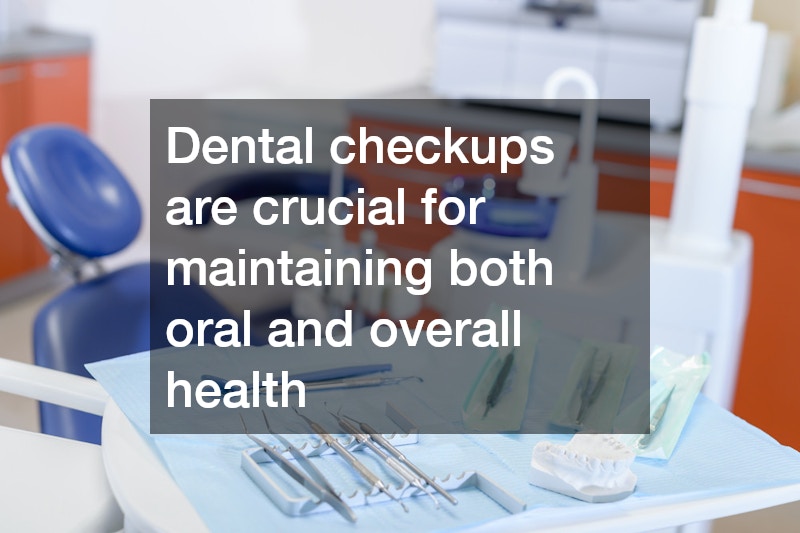
Why Regular Dental Checkups Are More Important Than You Think
In today’s fast-paced world, dental health often takes a backseat to other health concerns. Unfortunately, the ramifications of neglecting dental care can be far-reaching. Regular dental checkups are crucial for maintaining both oral and overall health. The common perception is that dental visits are necessary only when experiencing pain or discomfort; however, preventive care is a more effective approach. By the time a problem becomes evident, the damage may already be extensive, resulting in more invasive procedures.
This article aims to shed light on the importance of regular dental checkups and how they are more significant than many realize.
1. What Happens During a Dental Checkup?
A dental checkup typically begins with a thorough review of a patient’s dental history to assess any underlying issues or concerns. The dentist will examine the teeth, gums, and mouth for signs of decay, gum disease, or other anomalies. X-rays may be taken to provide a detailed view of teeth alignment and the condition of the jawbone, allowing for early detection of problems not visible to the naked eye.
Following the initial examination, a dental hygienist will perform a professional cleaning, which is a critical component of a dental checkup. Plaque and tartar build-up are removed during this process to prevent cavities and gum disease. The hygienist will also advise on personalized oral hygiene practices that can improve overall dental health. Proper cleaning techniques, the use of fluoride treatments, and mouthwash recommendations are typically part of this guidance.
The final aspect of a dental checkup involves preventive care measures like sealants, fluoride treatments, or a discussion about potential orthodontics. These steps help protect teeth and gums from future issues. Dentists may also screen for signs of oral cancer, as early detection is key to effective treatment. Overall, dental checkups are comprehensive evaluations designed to maintain oral health through preventive care.
2. How Often Should You Visit the Dentist?
Most dental professionals recommend visiting the dentist at least twice a year for routine checkups and cleanings. However, this recommendation can vary based on individual needs. Factors such as age, dental history, and current oral health condition play crucial roles in determining the frequency of visits. For example, children and teenagers may need more frequent checkups to monitor tooth development and alignment.
Individuals with a history of dental issues, like frequent cavities or gum disease, might require more regular visits. Adults who smoke or suffer from conditions such as diabetes may also need to schedule checkups more frequently due to their increased risk of oral health problems. It’s essential to consult with a dental professional to tailor a checkup schedule that best meets individual needs, ensuring optimal dental health.
For seniors or those with chronic health conditions that can affect oral health, the frequency of dental visits might also need to be adjusted. Conditions such as osteoporosis and medications that dry out the mouth can contribute to the development of cavities and other oral health issues. Ultimately, the goal is to prevent problems before they worsen, making personalized dental care schedules a priority.
3. What Are the Long-Term Benefits of Regular Dental Checkups?
One of the most significant long-term benefits of regular dental checkups is the early detection of oral health issues. Catching cavities, gum disease, or oral cancer in their early stages significantly increases the chances of successful treatment. This proactive approach can prevent minor issues from evolving into more significant problems that require invasive procedures, saving time and discomfort in the long run.
Regular dental visits also lead to cost savings. While dental procedures can be costly, preventive care reduces the likelihood of needing expensive treatments associated with advanced dental disease. Routine cleanings and checkups are a small investment compared to the cumulative costs of root canals, extractions, or dental implants required to address untreated conditions.
Moreover, there is a growing body of evidence linking oral health to overall systemic health. Conditions such as heart disease, diabetes, and even pregnancy complications have been associated with oral health issues like gum disease. Maintaining good oral health through regular checkups reduces the risk of these systemic health problems, underscoring the importance of dental care as part of your overall wellness strategy.
Regular dental checkups are a vital aspect of maintaining not just oral health but overall well-being. Through preventive care, early detection of issues, and personalized guidance, routine visits to the dentist can spare individuals the inconvenience and costs of advanced dental problems. Moreover, the connection between oral health and systemic health further emphasizes the need for routine checkups. Prioritizing dental health is crucial and should be integrated as part of a comprehensive approach to wellness, encouraging everyone to keep up with their dental visits.
